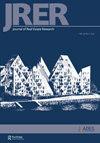How Do the CEO Political Leanings Affect REIT Business Decisions?
IF 1.2
4区 经济学
Q3 BUSINESS, FINANCE
引用次数: 1
Abstract
Business decisions made by the real estate industry can have a profound effect on the wellbeing of people who live, work, or shop in these buildings. While these decisions may be informed by evidence, the available evidence is often incomplete, unrepresentative or otherwise less than ideal. Therefore, the personal opinions or judgments of senior executives can have an effect. In this paper, we study these effects in two parts: risk-taking and Corporate Social Responsibility (CSR) activities. Since political opinion is a relatively stable measure, which is also associated with preferences for risk and CSR, we examine how the political leanings of the CEO are related to these effects. Based on the data from 1999 to 2013, we find that Real Estate Investment Trusts (REITs) with Democrat-leaning CEOs tend to take more risks, as evidenced by higher levels of leverage, more capital expenditures and risky investments. We further find that politically active CEOs are more broadly engaged in different types of CSR activities. JEL Codes: D21, G32, M14, Q56首席执行官政治倾向如何影响REIT业务决策?
房地产行业做出的商业决策会对在这些建筑中生活、工作或购物的人们的福祉产生深远的影响。虽然这些决定可能是根据证据作出的,但现有的证据往往是不完整的、不具代表性的或不太理想的。因此,高管的个人意见或判断可能会产生影响。本文将从风险承担和企业社会责任(CSR)活动两个方面对这些影响进行研究。由于政治观点是一个相对稳定的衡量标准,它也与风险偏好和企业社会责任有关,我们研究了CEO的政治倾向如何与这些影响相关。基于1999 - 2013年的数据,我们发现ceo倾向民主党的房地产投资信托基金(REITs)倾向于承担更大的风险,这体现在更高的杠杆水平、更多的资本支出和风险投资上。我们进一步发现,政治活跃的ceo更广泛地参与不同类型的企业社会责任活动。JEL代码:D21, G32, M14, Q56
本文章由计算机程序翻译,如有差异,请以英文原文为准。
求助全文
约1分钟内获得全文
求助全文
来源期刊

Journal of Real Estate Research
Multiple-
CiteScore
1.40
自引率
12.50%
发文量
29
期刊介绍:
The American Real Estate Society (ARES), founded in 1985, is an association of real estate thought leaders. Members are drawn from academia and the profession at large, both in the United States and internationally. The Society is dedicated to producing and disseminating knowledge related to real estate decision making and the functioning of real estate markets. The objectives of the American Real Estate Society are to encourage research and promote education in real estate, improve communication and exchange of information in real estate and allied matters among college/university faculty and practicing professionals, and facilitate the association of academic, practicing professional, and research persons in the area of real estate.
 求助内容:
求助内容: 应助结果提醒方式:
应助结果提醒方式:


